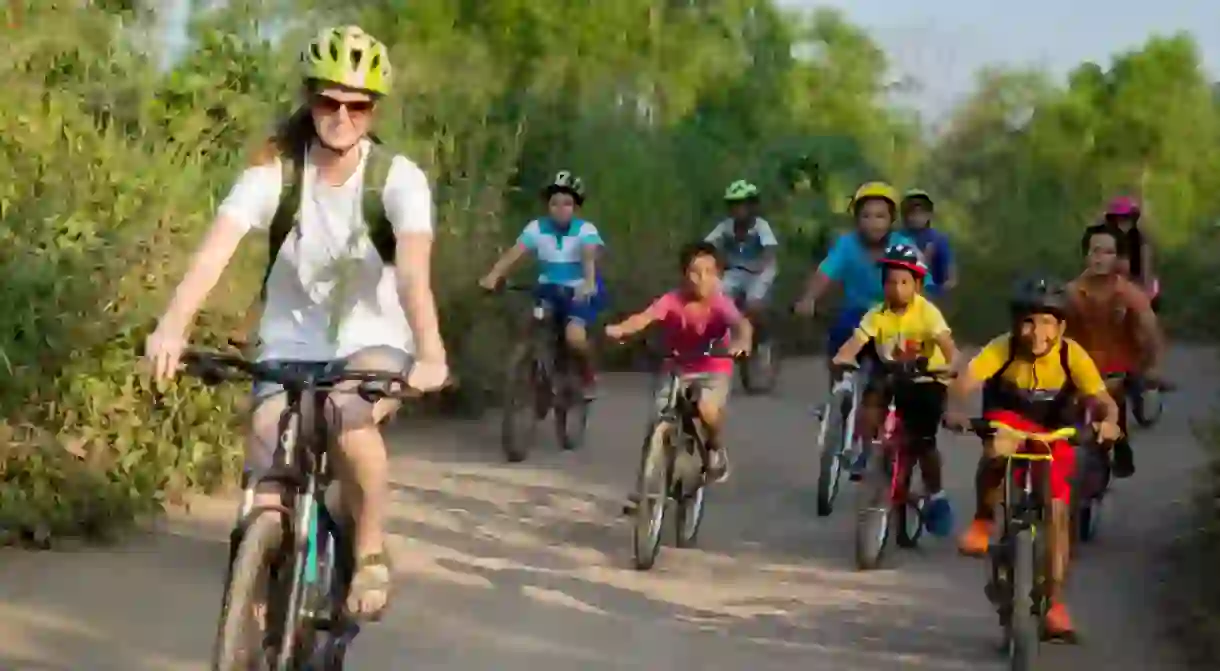The Mexican Eco-Resort Bringing Classes, Music and Hope to Its Neighbors

The founder of Careyes worked to establish a legacy to preserve the environment for future generations. But going beyond the limits of the resort itself, the community hopes to change the futures of kids in nearby Mexican rural villages.
Known for its colorful ocean houses and distinctive architecture, Careyes attracts affluent vacationers to Mexico’s Pacific coast for rental properties, surf, sun and adventures. The area and surrounding jungle remain relatively unchanged from when founder Gian Franco Brignone first visited in 1968. This relatively new community has always committed to minimizing the use of asphalt, taking advantage of natural ocean breezes and protecting the sea turtles that come to its shores. Though staying here is an amazing experience, the resort provides a very different lifestyle than the one the villagers just beyond its boundaries have.

Rural communities in Mexico often don’t receive the resources or financial support their urban counterparts do, and as a result, the people who live there don’t have as many opportunities. Filippo Brignone, son of the original founder, and other members of Careyes saw an opportunity to make a difference, one that would not only benefit the local villages but the entire Costalegre region.
Brignone helped start the Careyes Foundation, a registered 501 (C) (3) public charity, in 2013. With the help of contributions from private foundations and individuals, the program has built a relationship with 11 nearby villages through cultural initiatives, music, sports, conservation and English-language classes. Brignone, who spent much of his youth in Careyes and has 25 years of experience in finance and business, serves as the foundation’s president.

“A community cannot thrive unless it is healthy in every aspect,” Brignone says. “The natural environment must be preserved. Education, as a fundamental right, must be available to all. Citizens must be provided opportunities for employment and long-term prosperity. If any of these elements fail, the community as a whole suffers.”
The foundation’s largest program is its Children’s English Program (CEP), which started in 2015, according to Sarah Lerman, director of the Careyes Foundation. “We reach around 850 children a year in 12 local public elementary schools,” she says.

Before CEP, local children didn’t learn English until middle school, and the state-mandated curriculum at that point assumed they already knew some basic English. As a result, the students struggled in an area where the stakes couldn’t be higher – English is a crucial key to securing a job locally in the tourism industry as well as pursuing higher education and many other career opportunities.
To help set the kids up for success, the foundation created its own customized English-Spanish workbook series specifically for rural school children in the 2nd through 6th grades. It’s also helped facilitate classes featuring games, songs and creative activities designed to teach English words. The program has been such a success that other organizations in the state of Jalisco have adopted it, reaching an additional 350 students in their areas.

One of these organizations is the Jose Cuervo Foundation. In exchange for advising the Cuervo Foundation on how to set up their own English program in the town of Tequila, the Cuervo Foundation helped the Careyes Foundation set up a music school, like the one they started in Tequila 15 years ago.
Careyes’ music program teaches approximately 75 children and adults how to sing in a choir, play guitar and learn music theory. While the program will continue to increase its children and adult choirs, Lerman says, it also hopes to offer instruction in piano, wind and other instruments with the goal of eventually having a Careyes orchestra and mariachi band.
In addition to the music school, the Careyes Foundation has a month-long artist residency program that welcomes renowned Mexican and international artists to host special events and art exhibits for the community. At some point during their residency, each artist is required to hold workshops for the children in one of the villages.
The foundation also hosts kids at its 45-seat cinema to watch popular movies like Ratatouille free of charge and hear subject-related professionals, like a chef, speak.
Since Careyes is located in such a beautiful environment, the foundation works to instill an appreciation of the area on its bike rides. Held twice a month on a rotating basis in the villages, the rides include lessons on local flora and fauna and usually the opportunity to play in the ocean or a nearby river. Up to 50 kids and their parents usually participate with the foundation, which provides bicycles, helmets and drinking water.
Local students can also learn about their natural environment and conservation through field trips to the foundation’s Sea Turtle Protection & Conservation Center, a research station and turtle sanctuary at Playa Teopa. Since 1983, more than 1.5 million turtle hatchlings have been released, and the students have not only participated but gained respect for the vital role these animals play in the ocean.
“Our range of programs are all about broadening horizons, exposing local kids to new experiences and giving them access to a well-rounded education in and out of the classroom,” Lerman says.
Brignone believes efforts like these make the entire community, Careyes and its neighboring villages, stronger together.













